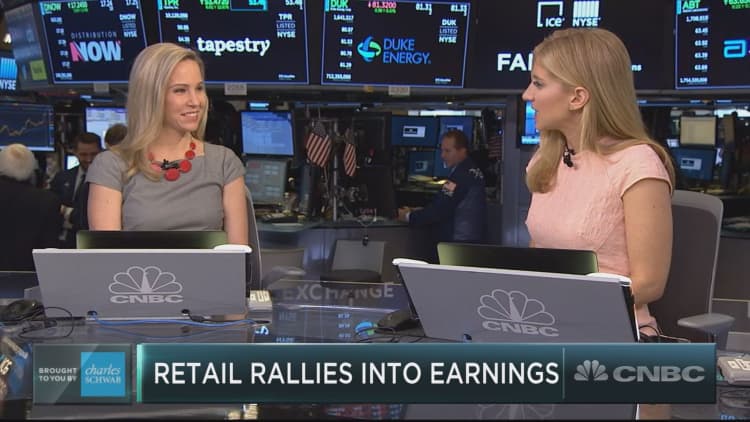
An epic rally for Macy's came to a screeching halt after it reported sales were flat for its latest quarter.
Its sell-off is a temporary setback on the path to further gains for the retailer and its peers, said Lindsey Bell, investment strategist at CFRA Research.
"Today's sellers are clinging to one of the shorts' theses. That is, increased spending on investments will lead to lower margins. That has not the case in the past three quarters as operating income margins expanded," Bell told CNBC in an email.
Macy's tumbled nearly 15 percent Wednesday, putting it on track for its worst session since May 2017. The department store chain said net cash used by investing activities in the first half of its fiscal year increased to $312 million from $210 million in the same period in 2017. Macy's topped earnings and sales estimates for its fiscal second quarter, however.
"We view the second quarter results and higher guidance as outstanding," added Bell. "We continue to believe this stock will continue to buck the trend in price performance in the August and September period, outperforming the historical trend for the retail index to decline in those months."
A retail revival this year has helped to drive gains across the group. The XRT retail ETF rallied over the summer to recapture records as recently as Tuesday. Before last week, the group had not reached new highs since March 2015. The sell-off in Macy's on Wednesday pulled the XRT ETF down nearly 3 percent.
If fundamentals continue to power upward momentum as Bell expects, the high number of short positions in department store stocks could get squeezed.
"Valuations are still very strong and the short interest is just a little bit of the icing on the cake that will help these stocks pop," Bell said Tuesday on CNBC's "Trading Nation," a day before Macy's reported.
"For Macy's, for instance, before 2017 short interest was around about 5 percent but now that's in the 15 percent to 16 percent range," Bell said. "It's very high relative to other retailers which the average is about 5 to 6 percent."
Other department store chains have similar short interest. Kohl's has short interest at 16 percent and Nordstrom at 13 percent. Short positions grew in recent years as Amazon's expansion engendered belief in retail's demise.
A short squeeze occurs when a highly shorted stock moves higher and short traders then buy up shares to cover their positions to avoid further losses.
Retail's moves higher have already pushed shorts to cover their positions. Macy's, Nordstrom and Kohl's had high interest at around 20 percent at this time last year, which has now dropped to the mid-teens. Macy's is up 78 percent over the past 12 months, and Kohl's is up 96 percent, though Nordstrom has lagged the group with a more subdued 17 percent gain.






